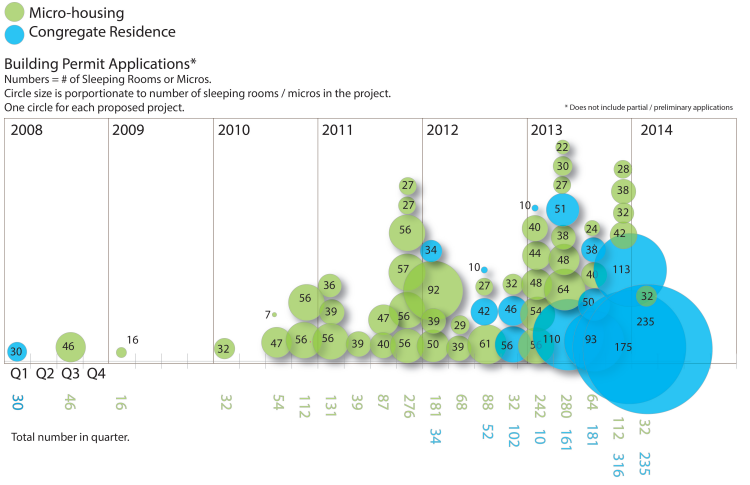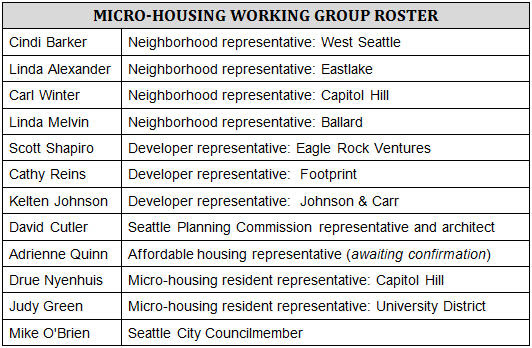Last week was the first meeting for the micro-housing working group. Council Member Mike O’Brien announced the working group during a prior Planning, Land Use and Sustainability (PLUS) committee meeting. The group will examine regulations on micro-housing proposed by the Department of Planning and Development (DPD) and consist of stakeholders representing various interest groups. In an email to those subscribed to micro-housing updates, Council Member O’Brien laid out the goals, the process and make-up of the working group.
The Background
This development was the result of a larger planning process that is looking in detail at micro-housing in Seattle. Regulations were developed by the DPD, some of which I have covered previously. Since the process began, there has been a lot of great research on micro-housing in Seattle, including a visual differentiating micro-housing from other types of housing and this excellent graph showing how much is being built compared to congregate housing:

Working Group Goals
The working group will be tasked with determining how micro-housing should function and where it should be built. Council Member O’Brien’s notice makes clear that whether or not micro-housing should exist will be off the table. This point should eliminate the concern trolling by groups that fear the units are unlivable (the word “coffins” has been tossed around). With that purpose in mind, the group will attempt to find areas of consensus.
The Process
Points of consensus will be brought before the PLUS committee to consider as part of the legislation. Areas where there is not consensus, the main points of discussion will be used to help draft legislation. The meetings will be open to the public and take place in City Hall or the Seattle Municipal Tower. You can see updates for the meetings here. The final two are scheduled for:
- Meeting 2: July 1, 8-10am
- Meeting 3: July 17, 5:30-8:00pm
Council Member O’Brien hopes to have legislation prepared by August.
Working Group Members
As mentioned in our previous micro-housing post, this group provides a great opportunity for the discussion to be more balanced with the inclusion of new and important interests. Many of the meetings on micro-housing were overwhelmed by neighbors of the projects who have a less direct stake than people actually living in the buildings. The group consists of four neighborhood representatives, three micro-housing developers, one member of the Seattle Planning Commission, potentially one representative from an affordable housing group, two micro-housing residents, and Council Member O’Brien.  How You Can Help
How You Can Help
The first working group meeting was held last week, but there are still two more meetings that you can attend if you’d like to learn more. The meetings will not be a venue to publicly comment, but you can still submit comments to Council Member O’brien himself or the working group for them to consider during their discussion. Things you might want to encourage include:
- Not requiring additional parking above and beyond what’s already required. Additional parking requirements will dramatically increase the cost of housing which undermines the primary purpose of these projects.
- Allowing food prep areas in the individual units.
- Not creating a different design review process than required of similarly scaled projects.
- Not preventing micro-housing in LR2 zones where it is legal to build small apartments.
You should also feel free to commend Council Member O’Brien for his leadership on this issue. From the view of someone that attended public meetings on this topic, I was surprised by the move to form the working group. The loud minority that is vehemently opposed to these projects appeared to have hijacked the discussion and it seemed like there wouldn’t be a careful consideration of the impact from proposed regulations. Council Member O’Brien showed a lot of leadership by not cowing to their demands and including residents of these buildings in the decision making process. While we don’t expect the final regulations to be perfect, we are looking forward to the legislation that results from these discussions.

Owen Pickford
Owen is a solutions engineer for a software company. He has an amateur interest in urban policy, focusing on housing. His primary mode is a bicycle but isn't ashamed of riding down the hill and taking the bus back up. Feel free to tweet at him: @pickovven.


